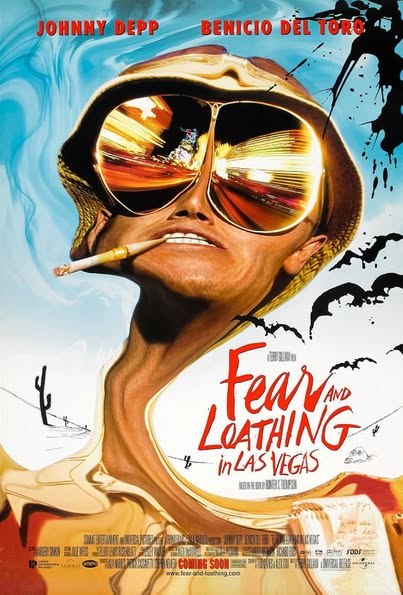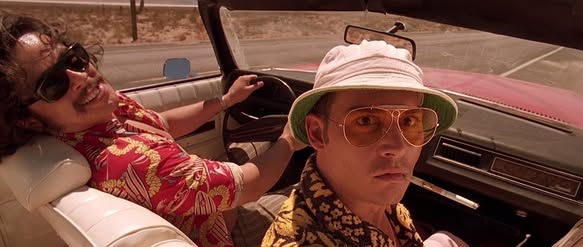Fear and Loathing in Las Vegas (1998)

Fear and Loathing in Las Vegas (1998), directed by Terry Gilliam, is a surreal and visually striking adaptation of Hunter S. Thompson’s iconic novel. This film is a wild ride through the chaotic landscape of American culture in the 1970s, blending dark comedy, social commentary, and a psychedelic journey that challenges the boundaries of reality.
The narrative follows journalist Raoul Duke, portrayed by Johnny Depp, and his attorney, Dr. Gonzo, played by Benicio del Toro, as they embark on a drug-fueled road trip to Las Vegas. Their primary mission is to cover a motorcycle race, but the journey quickly spirals into a hallucinatory exploration of excess, paranoia, and the American Dream gone awry. The film’s non-linear structure mirrors the disorienting effects of the substances consumed by the characters, creating a chaotic yet captivating viewing experience.

Visually, Fear and Loathing in Las Vegas is a feast for the senses. Gilliam’s imaginative direction employs vibrant colors, striking cinematography, and surreal imagery that immerses viewers in the characters’ distorted perceptions. The film’s aesthetic captures the essence of the era while also serving as a critique of the disillusionment that followed the counterculture movement of the 1960s.
The performances by Depp and del Toro are both memorable and transformative, bringing to life Thompson’s larger-than-life characters. Their dynamic showcases the camaraderie and madness of their journey, with moments of humor juxtaposed against the darker themes of addiction and self-destruction. The film also features a strong supporting cast, including appearances by familiar faces that add to its eclectic charm.

Thematically, the film delves into the consequences of excess and the search for meaning in a rapidly changing society. It highlights the disillusionment with the American Dream, portraying the 1970s as a time of both liberation and chaos. As Duke and Gonzo navigate their surreal experiences, the film prompts viewers to reflect on the nature of reality and the impact of societal pressures on personal identity.
Upon its release, Fear and Loathing in Las Vegas received mixed reviews, with some praising its bold style and others critiquing its chaotic narrative. However, it has since gained a cult following and is celebrated for its unique approach to storytelling and its exploration of countercultural themes.

Overall, Fear and Loathing in Las Vegas remains a significant film that captures the essence of an era while offering a thought-provoking examination of the complexities of human experience. Its blend of humor, horror, and surrealism continues to resonate, making it a standout entry in the canon of modern cinema.











